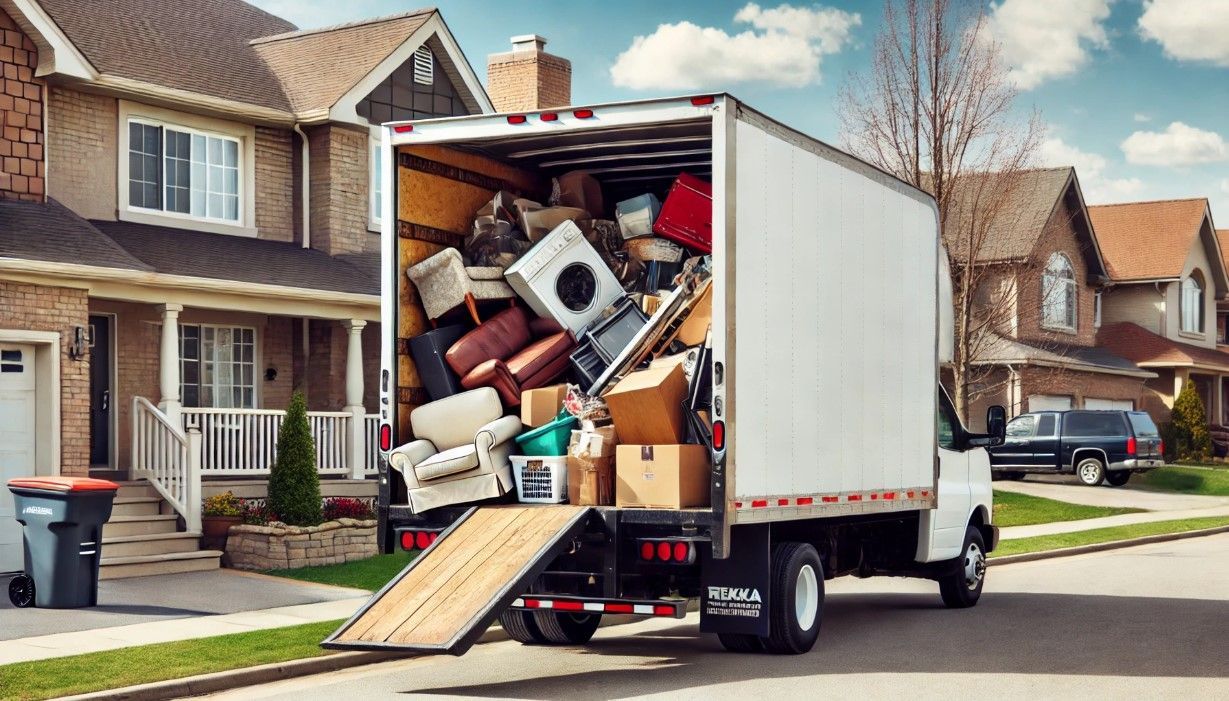
How to Effectively Dispose of Household Junk
Feeling overwhelmed by the clutter in your home? You're not alone. Household junk disposal can be a daunting task, but it's essential for maintaining a clean and organized living space. In this guide, we'll explore practical methods for sorting, recycling, and disposing of unwanted items. Whether you're downsizing, moving, or just decluttering, these tips will help you tackle junk removal like a pro.
What is Household Junk?
Household junk refers to any unwanted or unused items that accumulate in a home over time. This can include:
- Old furniture: Broken chairs, tables, and sofas that are no longer in use.
- Electronics: Outdated gadgets like old TVs, computers, and phones.
- Clothing: Clothes that no longer fit or are out of style.
- Miscellaneous clutter: Items like broken appliances, toys, books, and more.
Understanding what qualifies as junk is the first step in effective disposal. Knowing what you have and categorizing it makes the process more manageable.
Why Proper Disposal Matters
Proper junk disposal is crucial for several reasons:
- Environmental Impact: Improper disposal of items like electronics can lead to hazardous waste, which harms the environment.
- Health and Safety: Clutter can become a safety hazard, especially if it blocks pathways or accumulates dust and mold.
- Mental Well-being: A clean, organized space contributes to reduced stress and improved mental clarity.
By disposing of junk correctly, you protect your health, contribute to environmental conservation, and enhance your living space's overall aesthetic.
Step-by-Step Guide to Household Junk Disposal
1. Assess and Sort Your Junk
Begin by taking an inventory of all the junk in your home. Go room by room and categorize items into:
- Keep: Items you still use or have sentimental value.
- Donate: Items in good condition that someone else could use.
- Recycle: Materials that can be recycled, such as paper, glass, and certain plastics.
- Dispose: Items that are broken or unusable.
- Tip: Use large bins or bags to separate items as you go through each room. This helps keep the process organized and efficient.
2. Decide Between DIY and Professional Help
Once you've sorted your items, decide whether you want to handle the disposal yourself or hire professionals. Here are some factors to consider:
- DIY Disposal: Ideal for small amounts of junk or when you're on a tight budget. This involves trips to recycling centers, donation centers, or a local landfill.
- Professional Junk Removal Services: These services can save you time and effort, especially for large-scale cleanouts or if you have items that are difficult to transport.
Pros and Cons of DIY vs. Professional Junk Removal
| Method | Pros | Cons |
|---|---|---|
| DIY Disposal | Cost-effective, flexible scheduling | Time-consuming, requires transportation |
| Professional Junk Removal | Convenient, handles heavy/bulky items | More expensive, scheduling may be required |
3. Recycle and Donate When Possible
Before heading to the landfill, consider recycling or donating items. Here’s how you can handle different categories:
- Electronics: Many communities have e-waste recycling programs. Check with local electronics stores or recycling centers.
- Clothing and Textiles: Donate gently used clothing to shelters or thrift stores. Some fabrics can also be recycled into new materials.
- Furniture and Household Goods: Many charities accept furniture and household goods that are in good condition. Some may even offer pick-up services.
Tip: Check online for local recycling programs and donation centers to see what items they accept.
4. Dispose of Hazardous Waste Properly
Items like batteries, paint, chemicals, and certain electronics contain hazardous materials and should not be thrown away with regular trash. Most communities offer specific days for hazardous waste disposal or have designated drop-off sites.
FAQs on Hazardous Waste Disposal:
Q: Can I throw old batteries in the trash?
A: No, batteries contain chemicals that can be harmful to the environment. Look for battery recycling programs in your area.
Q: What should I do with leftover paint?
A: Check if your community has a paint recycling program. If not, let the paint dry out completely before disposing of it in the trash.
5. Consider Renting a Dumpster for Large Cleanouts
If you’re dealing with a significant amount of junk, renting a dumpster might be the most efficient solution. Here are some benefits:
- Convenience: Dumpsters can be placed on-site, making it easy to load items as you clean.
- Capacity: They can hold large amounts of junk, which is ideal for home renovations or big cleanouts.
- Cost-Effective: Often more affordable than multiple trips to a landfill, especially if you have a lot of debris.
Dumpster Sizes and Their Uses
| Dumpster Size | Ideal For | Estimated Cost |
|---|---|---|
| 10-yard | Small cleanouts, yard waste | $200 - $300 |
| 20-yard | Medium-sized renovations, decluttering | $300 - $400 |
| 30-yard | Large home renovations, construction | $400 - $500 |
| 40-yard | Major projects, commercial use | $500 - $600 |
Maintaining a Junk-Free Home
Now that you've cleared out the clutter, it's important to maintain a junk-free home. Here are some tips:
- Regularly Declutter: Set aside time each month to go through your belongings and get rid of what you don't need.
- Adopt a Minimalist Approach: Be mindful of what you bring into your home. Consider the long-term need for an item before purchasing.
- Organize Storage Spaces: Use bins, shelves, and labels to keep items organized and easily accessible.
FAQs on Keeping Your Home Junk-Free:
Q: How often should I declutter my home?
A: Aim for at least once a month. Regular decluttering prevents the build-up of unnecessary items.
Q: What’s the best way to decide if I should keep an item?
A: Ask yourself if you've used it in the past year. If not, it might be time to let it go.
Disposing of household junk doesn’t have to be a daunting task. With a clear plan, you can efficiently sort, recycle, donate, and dispose of unwanted items. Whether you choose to do it yourself or hire professionals, the key is to stay organized and proactive. Remember, maintaining a clean and clutter-free home is an ongoing process. Regular decluttering and mindful purchasing can help you keep your space tidy and junk-free.
Got a junk removal story or tip? Share it in the comments below! And don't forget to share this post with friends who might need a little help decluttering their homes.
